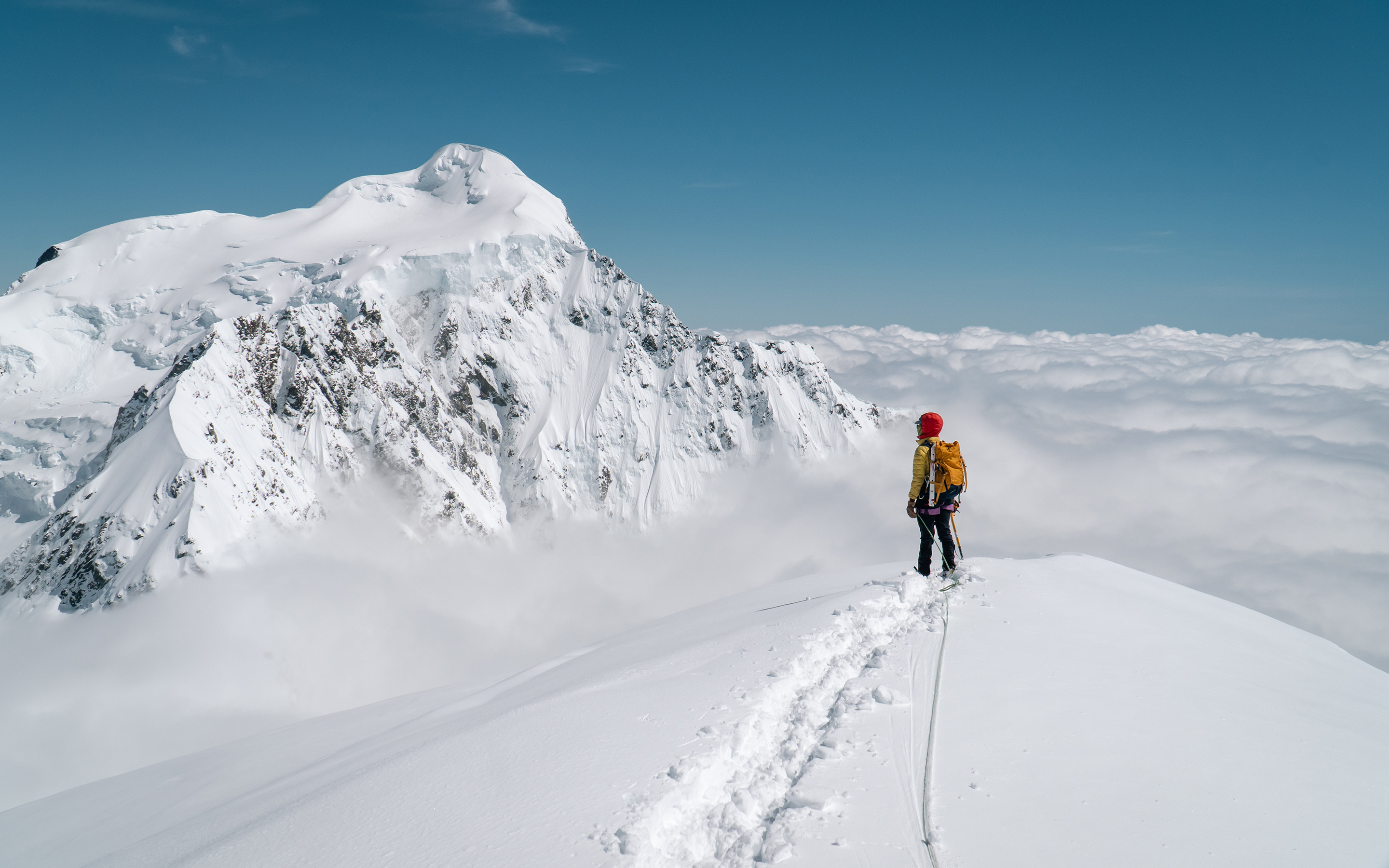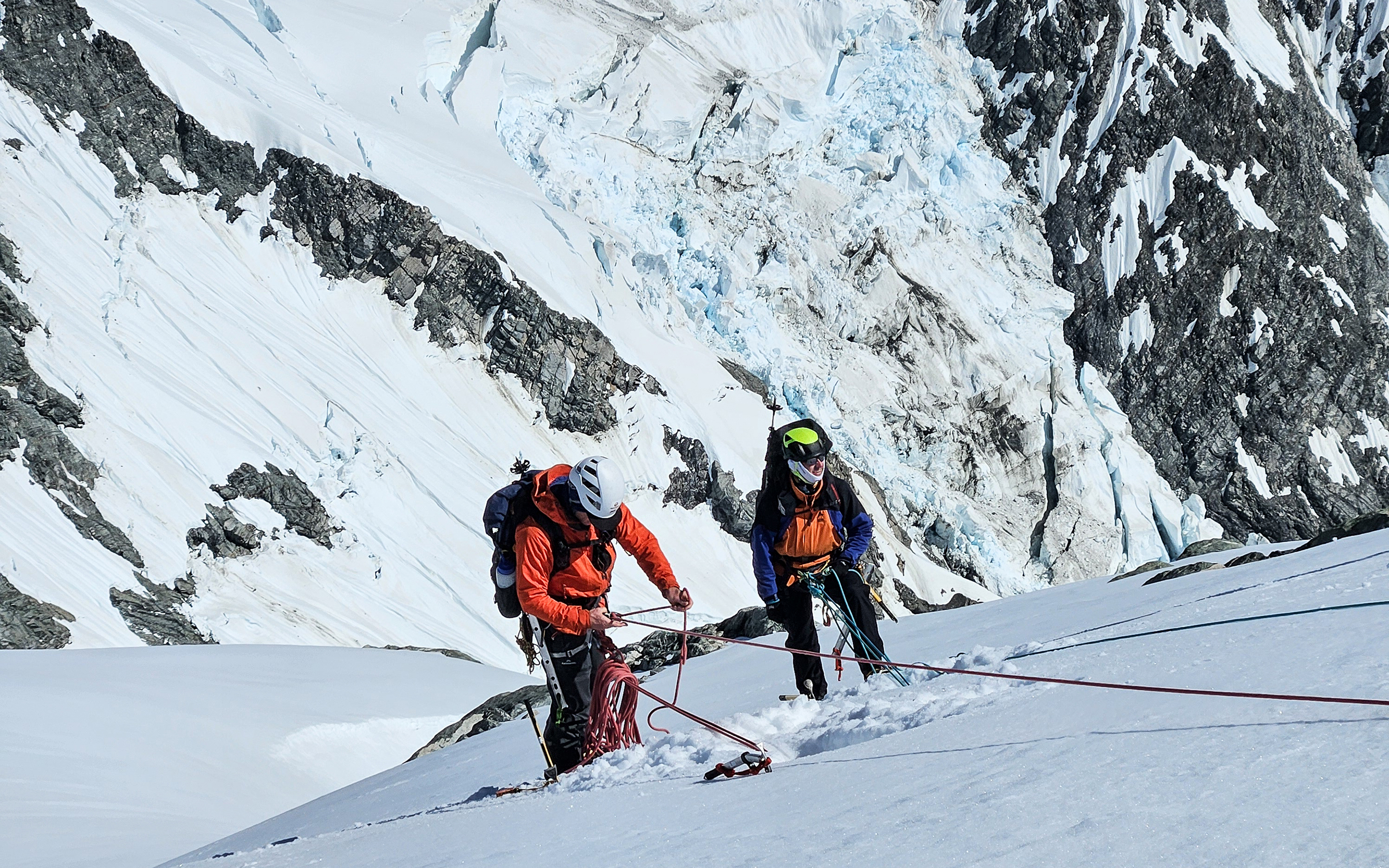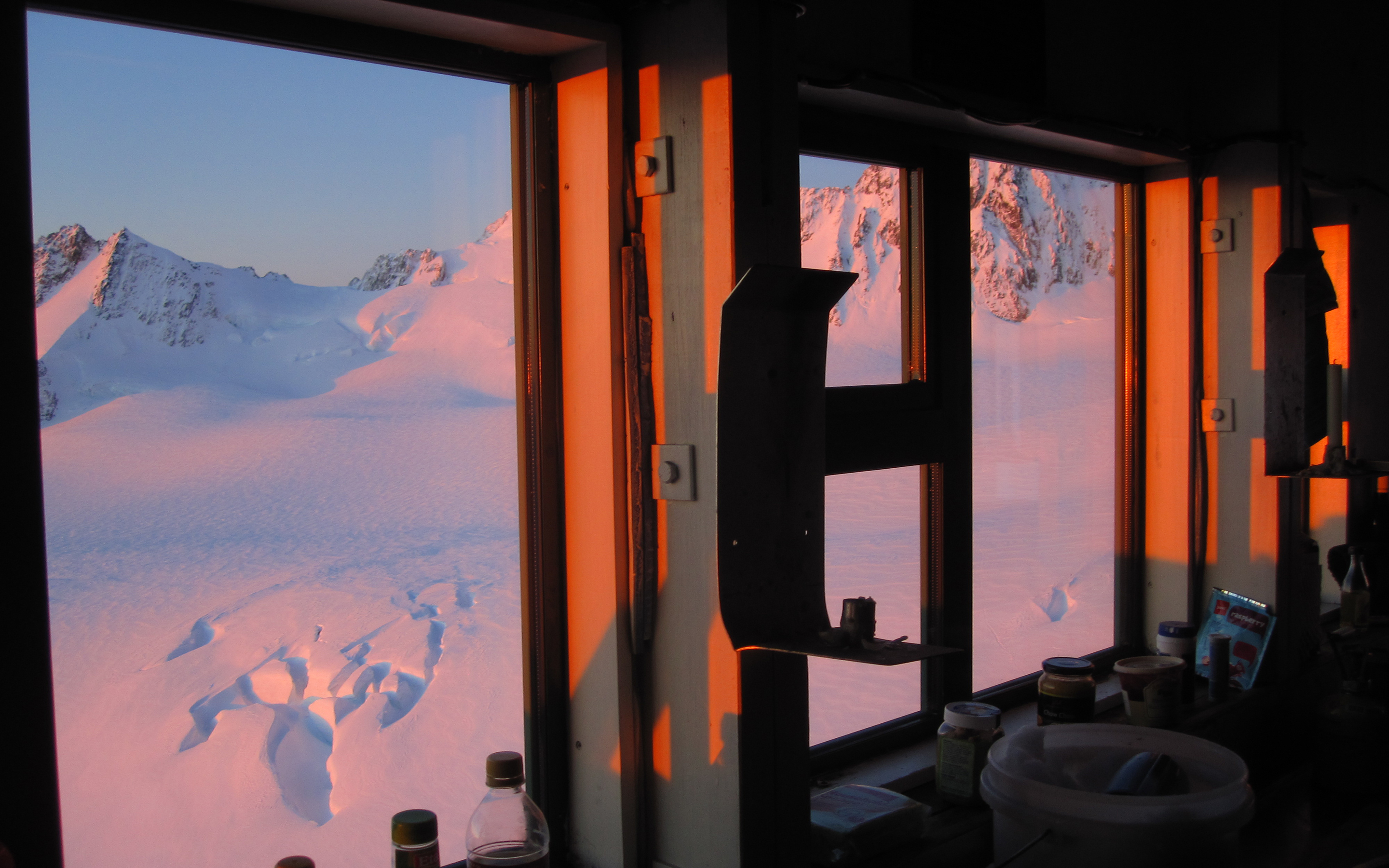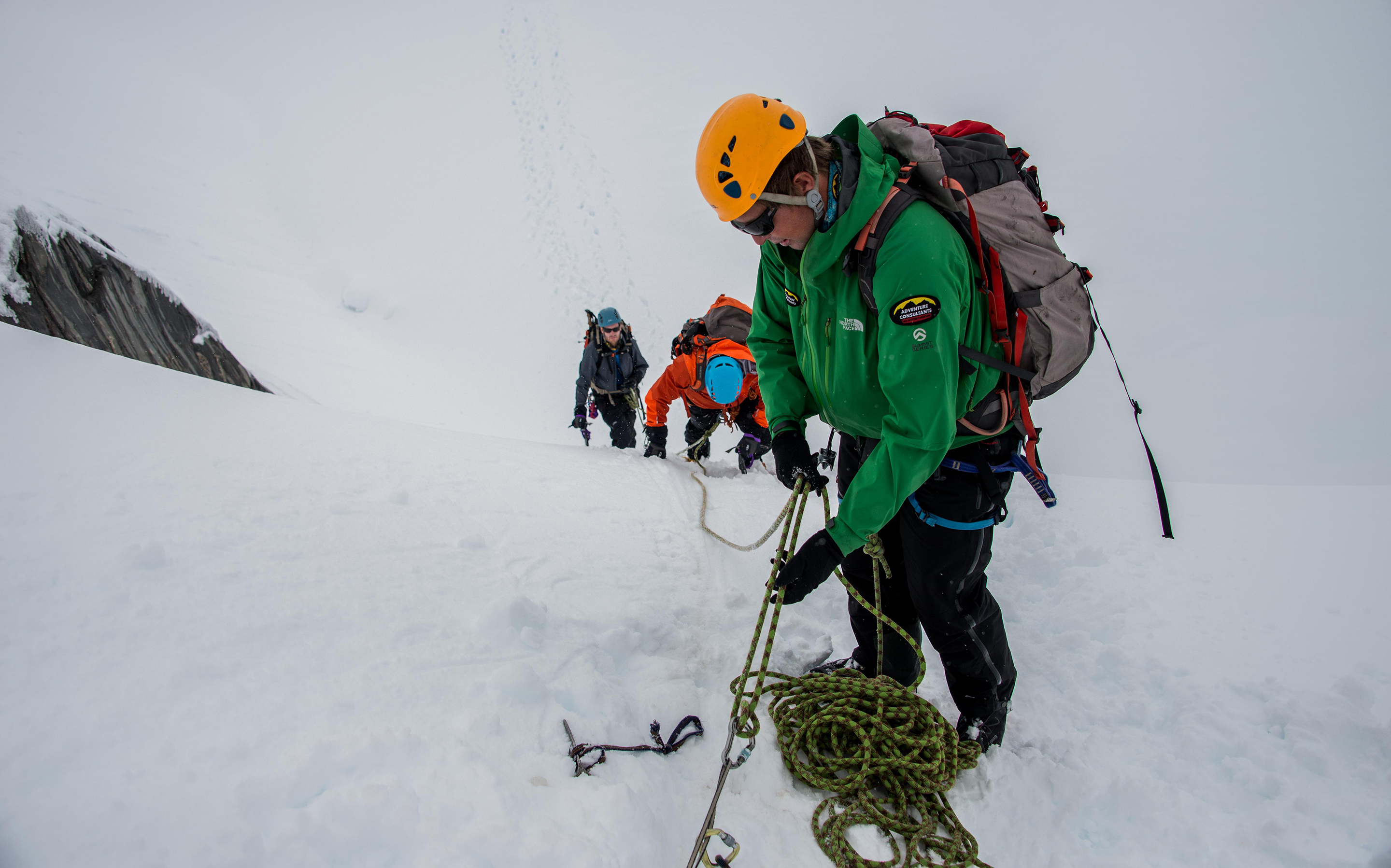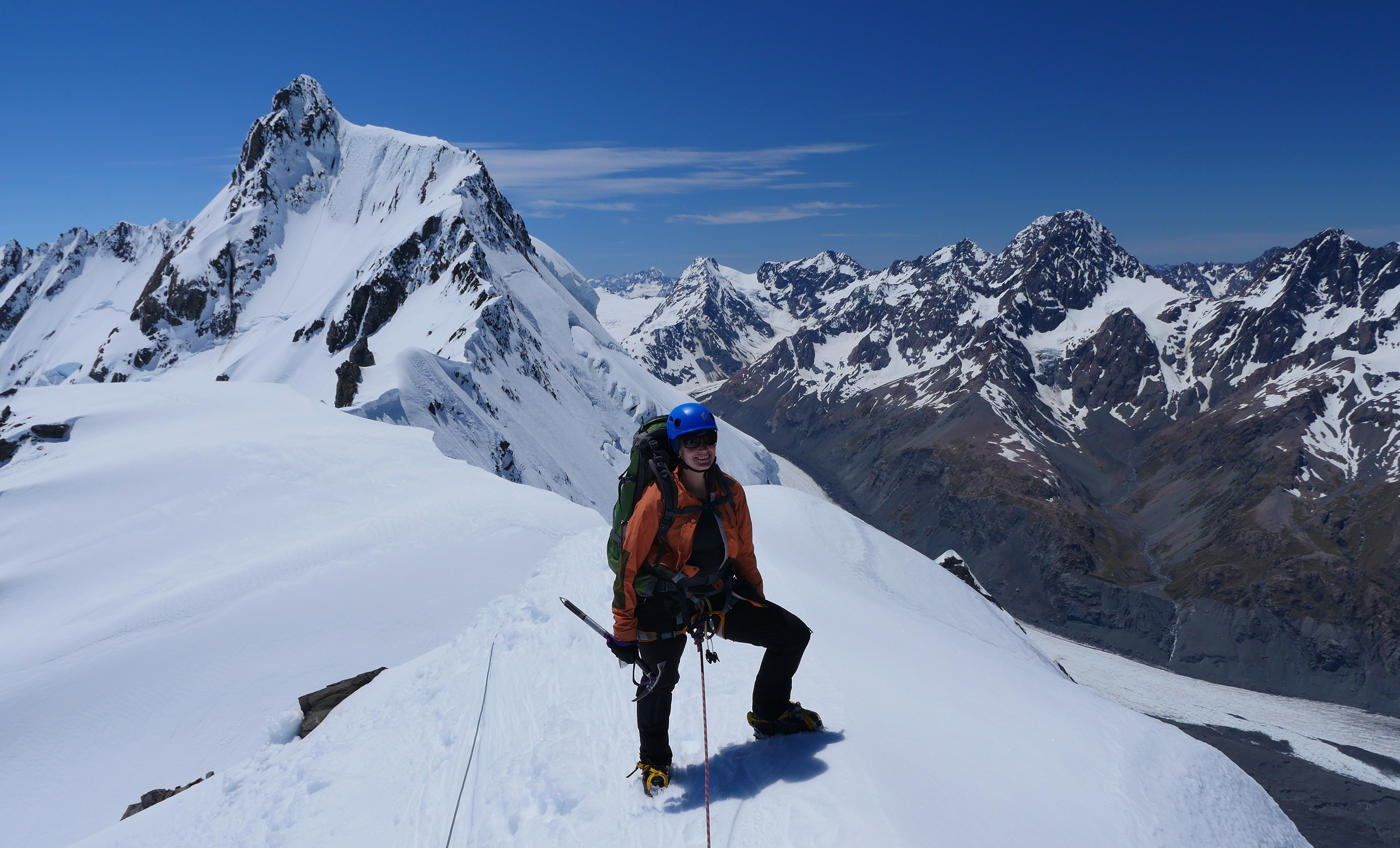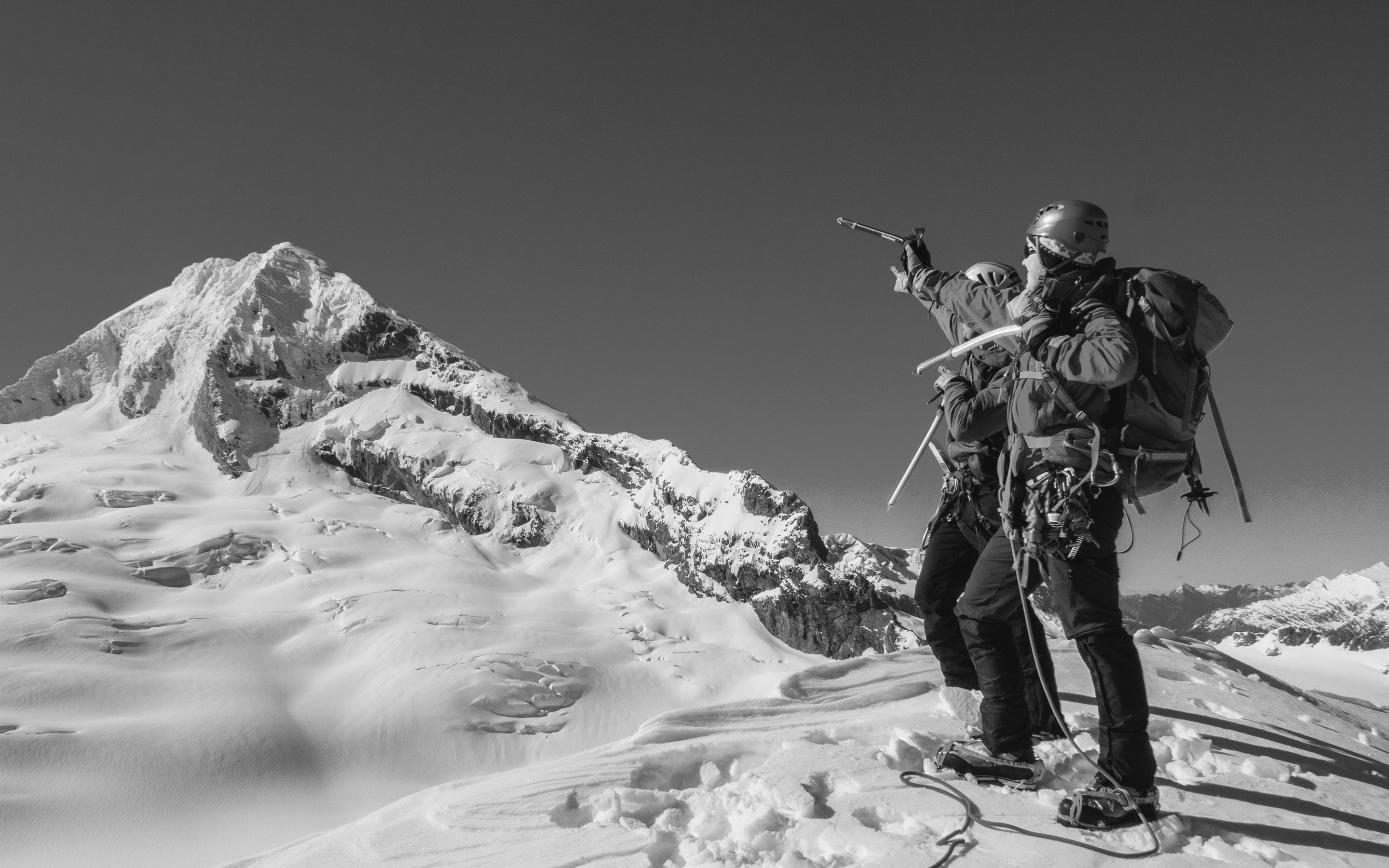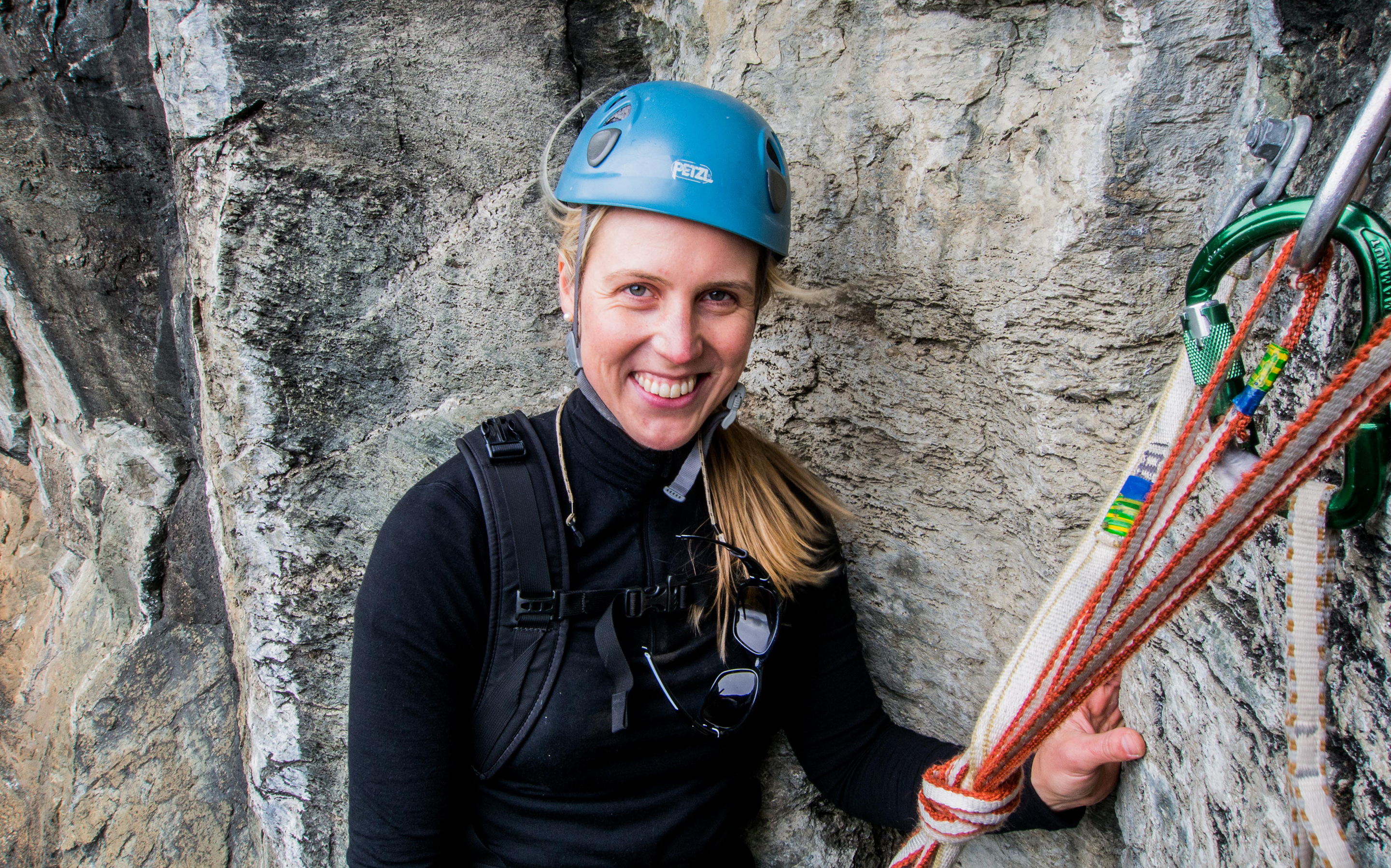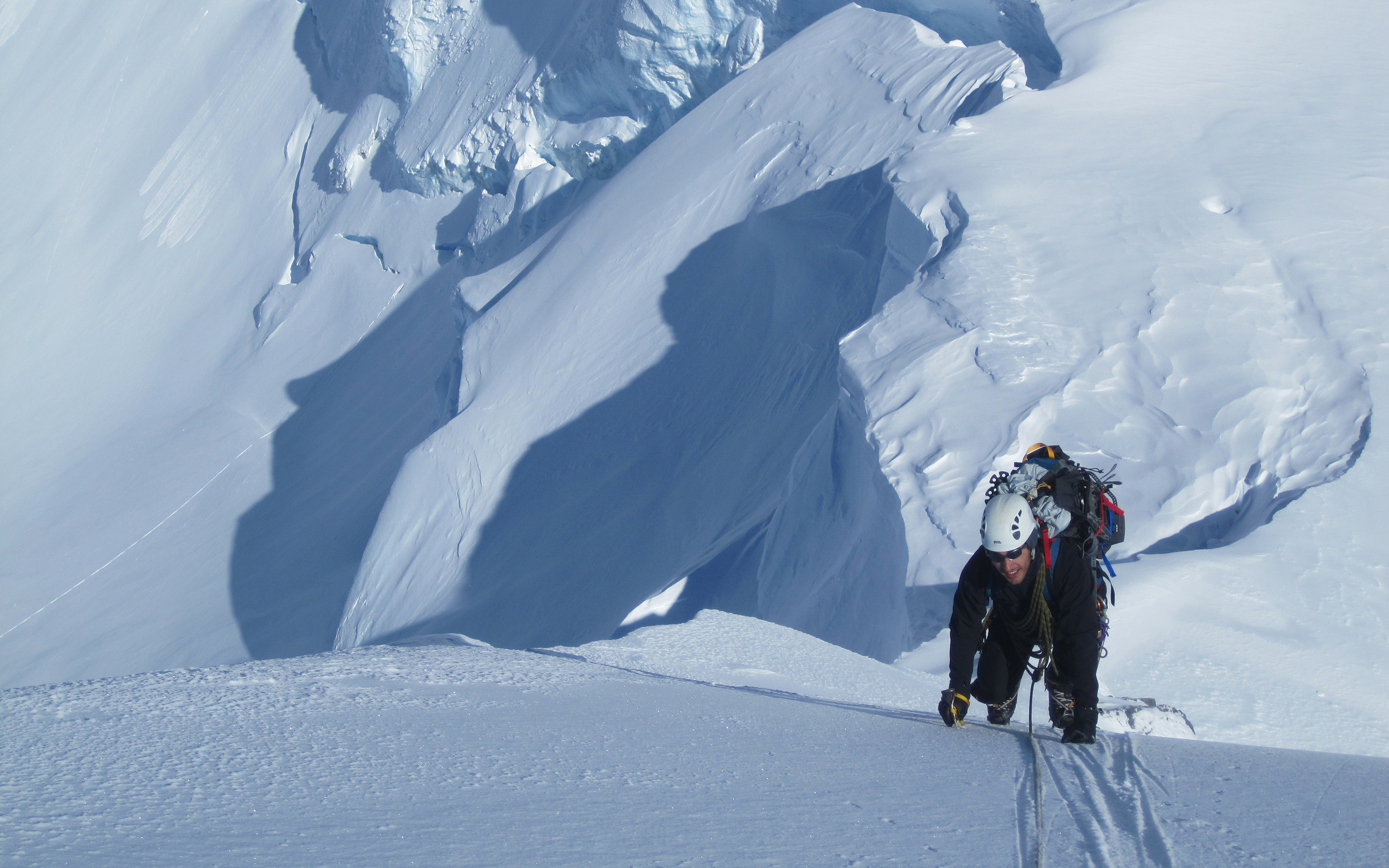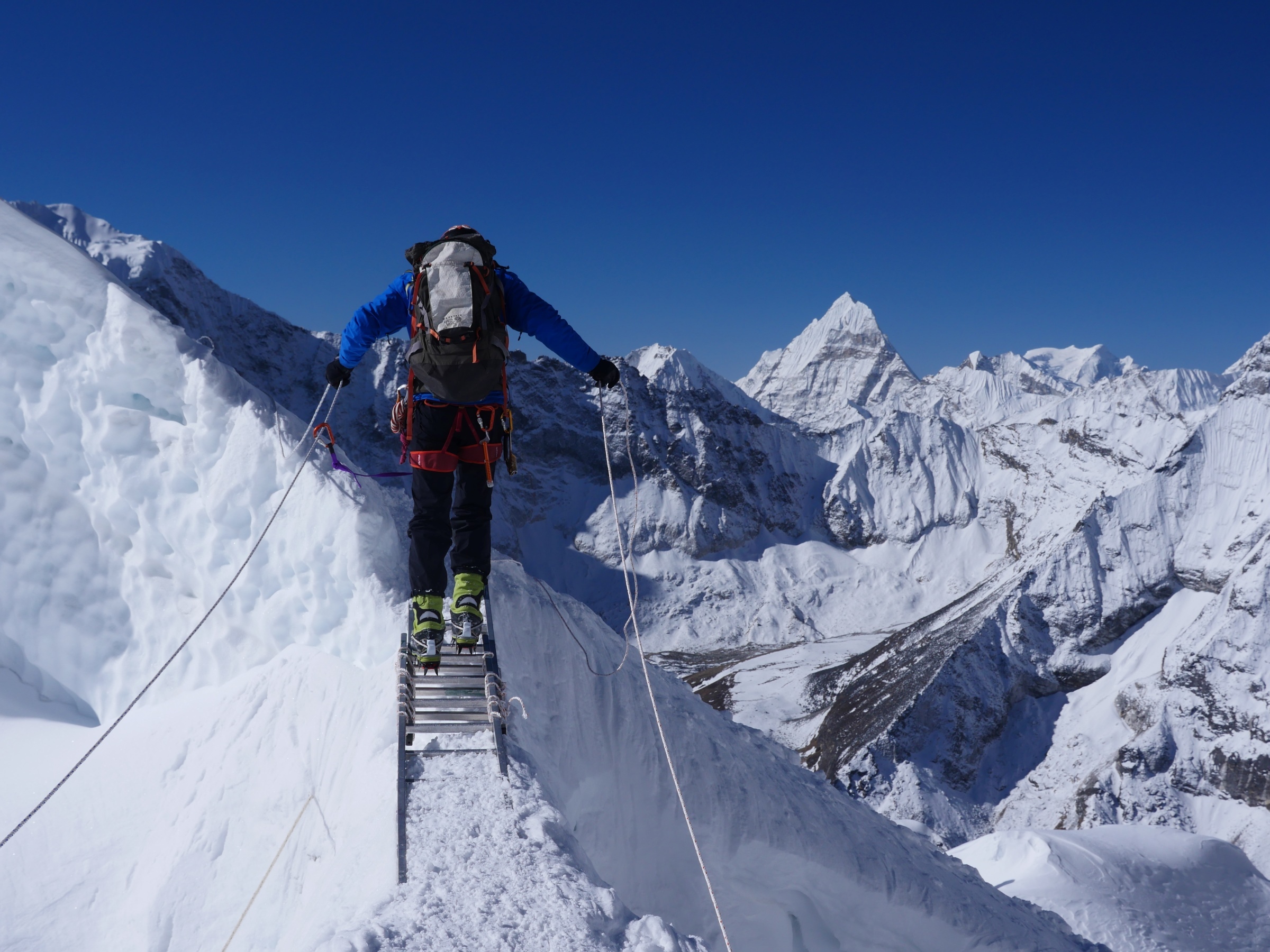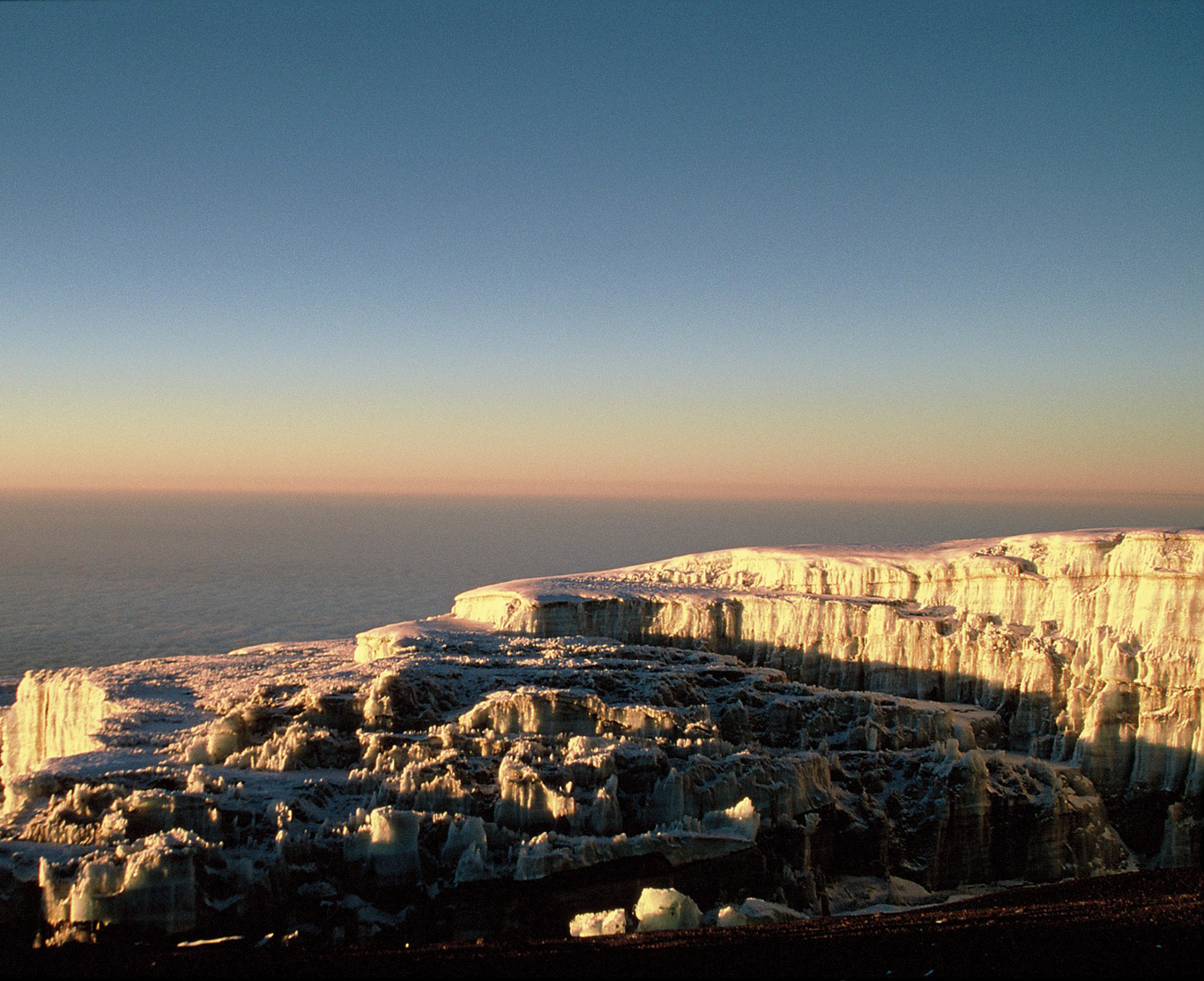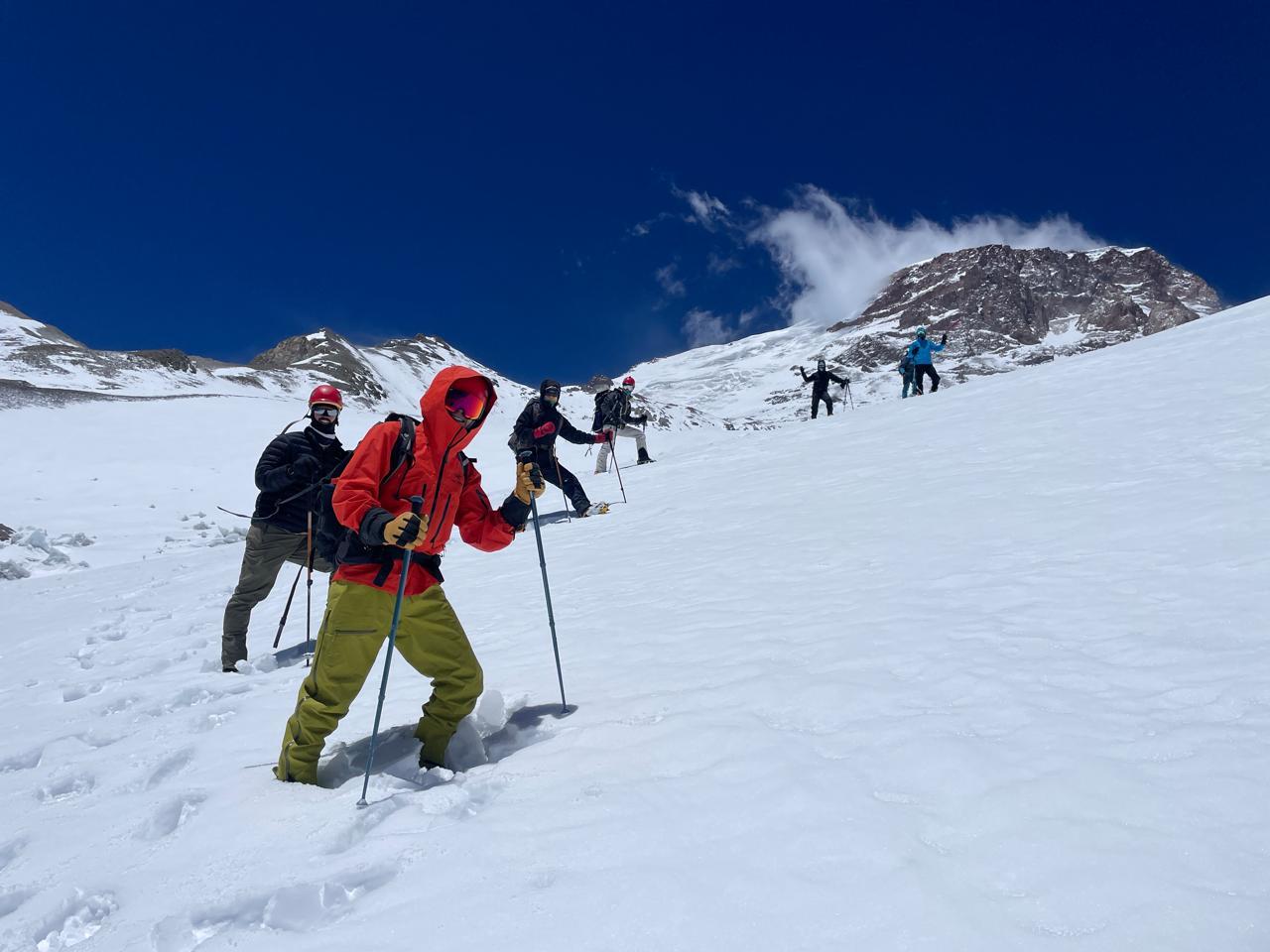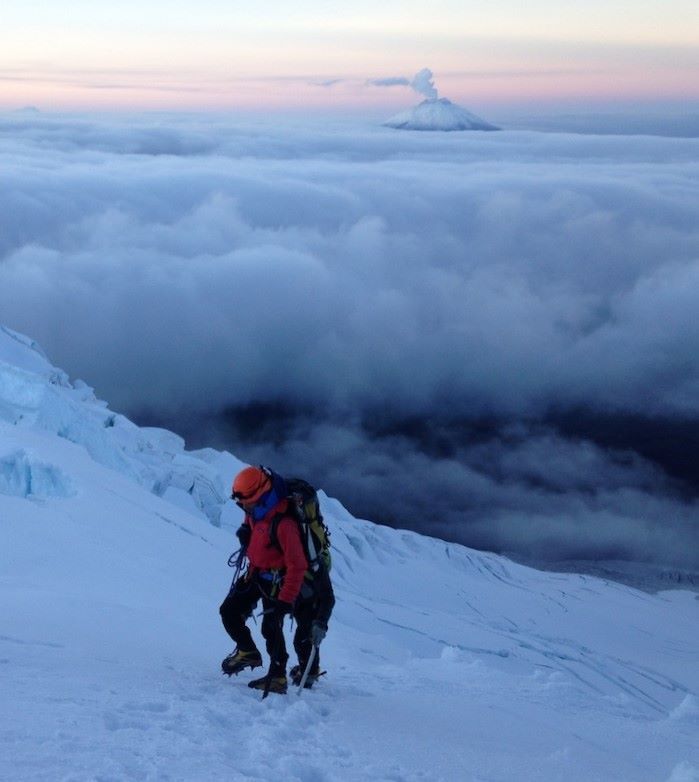A high level of aerobic fitness and tramping/hiking/bushwalking experience is expected. You will carry a 5-8 kg backpack each day and a heavier pack on longer days.
The Alpine Skills Course (ASC) will introduce you to the world of mountaineering on snow and ice. This is a 7-day introductory to intermediate-level alpine climbing course. You will develop the skills and confidence to safely undertake independent climbing trips in serious, glaciated alpine terrain - coached by NZ's guiding professionals.
The focus of the ASC is on skill development and building your core competencies. You will learn the safest, modern techniques for climbing on snow, ice, and alpine rock.
All training is by our professional IFMGA/NZMGA guides at a fantastic remote glaciated venue in the Aoraki Mount Cook alpine region. We fly in and out of the mountains to maximise your time in the mountains.
- New Zealand's most comprehensive introductory mountaineering course
- Learn skills while you climb
- Led by qualified and experienced IFMGA/NZMGA Mountain Guides
Climbing Ability
Climbing Ability
Beginner
Elevation
Elevation
2,000m/6,650ft
Duration
Duration
7 days
Location
Location
Aoraki Mount Cook, NZ
We believe that when working in a dynamic environment, it is not realistic to plan fixed day-to-day schedules. They can easily be disrupted. Instead, we work around prevailing weather and snow conditions to provide the most comprehensive coverage of all the course topics. This makes each ASC a unique trip.
After meeting your teammates and guide(s), the first morning involves an outline of the course, an equipment check and sort, and organising rental gear. If you have the time, some initial instruction (roping up for glacier travel, for example) will be covered.
We plan to fly in late on the first morning, or early afternoon. After landing, it may be a short stroll across to your hut - or you may need to rope up for glacier travel and haul your gear and food for up to 30 minutes to the hut.
Your guide will welcome you to your mountain home for the week and introduce you to "hut etiquette", while getting the kettle on. The rest of the day typically focuses on crampon/ice axe technique and self-arrest.
You may be in the mountains for up to 6 nights.
The focus of the ASC is getting you climbing and working with your climbing partners to develop solid, safe practices.
The first few days involve more theory and instruction, but we aim to get you on peaks or other objectives as soon as you have the basic skills under your belt (self-arrest/cramponing).
As you progress, the focus shifts to climbing on more complex terrain, and refining rope and anchor skills. You will spend at least a half-day working on real crevasse rescue scenarios, and at least another half-day ice climbing.
Instructional days begin at around 07:00 AM. When climbing on good weather days you may have “alpine starts” - as early as 04:00 AM if tackling a longer ascent. Most day's activities will have you out for 8 to 10 hours.
During any poor weather, you will be busy with rope skills, theory, and practical exercises, using instruction venues close to the hut.
We aim to have you back in Mount Cook Village by the afternoon of the final day.
The final day is spent on revision, a navigation exercise, and perhaps some rock climbing at the local crag before returning gear and finishing by 5 p.m.
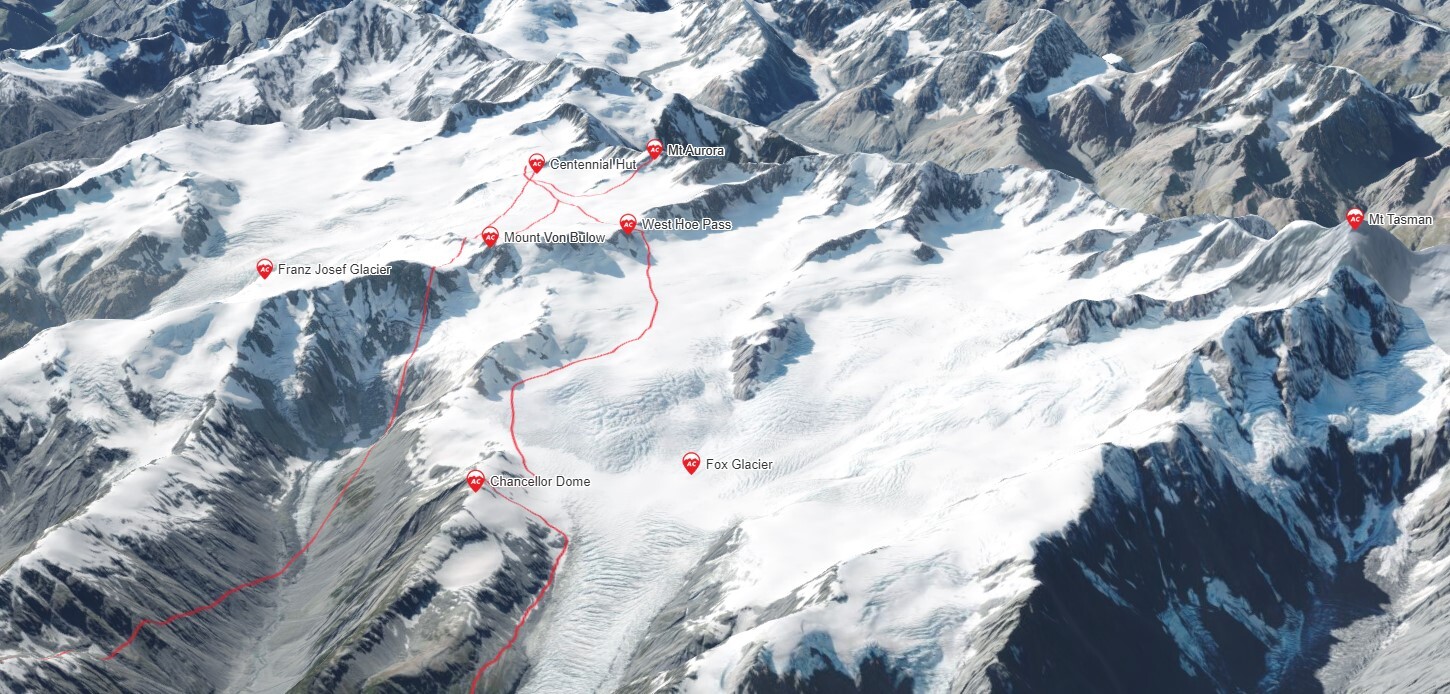
Departures and Pricing
| Start/End | Departing from | Quantity | Pricing | Notes | Book |
|---|---|---|---|---|---|
| 20 Feb - 26 Feb 2026 | Aoraki Mount Cook, NZ | Available | $4,695 NZD $ | ||
| 6 Mar - 12 Mar 2026 | Aoraki Mount Cook, NZ | Available | $4,695 NZD $ | ||
| 20 Mar - 26 Mar 2026 | Aoraki Mount Cook, NZ | Available | $4,695 NZD $ | ||
| 3 Apr - 9 Apr 2026 | Aoraki Mount Cook, NZ | Available | $4,695 NZD $ | ||
| 17 Apr - 23 Apr 2026 | Aoraki Mount Cook, NZ | Available | $4,695 NZD $ | ||
Training for a high-altitude objective? Check out our Expedition Training Course
PREPARE
All course participants must have basic rope management skills. Top-roped climbing gym experience is good. Outdoor rock climbing experience is even better.
You also need to be good on your feet, with good body coordination. A positive attitude and keenness to learn are must-haves! If you don’t have this experience, please talk to us before you think about booking.
Prior to this course, you should be able to:
- Be familiar with basic climbing knots (e.g. figure 8, clove hitch, Italian hitch, etc)
- Know how to use and tie into a harness
- Be able to operate a belay device and to belay your partner
- Prior alpine (snow and ice) mountaineering experience is not required.
- What equipment to bring and how to use it
- Trip planning and preparation
- Knots and hitches for mountaineering
- Snow and ice climbing
- Abseiling, belay techniques, and rope systems
- Snow, ice, and rock anchors
- Glacier travel and crevasse rescue
- Route finding and mountain navigation
- Emergency shelters
- Mountain weather and forecasting
- Basic avalanche hazard evaluation
- Hut management and food preparation.
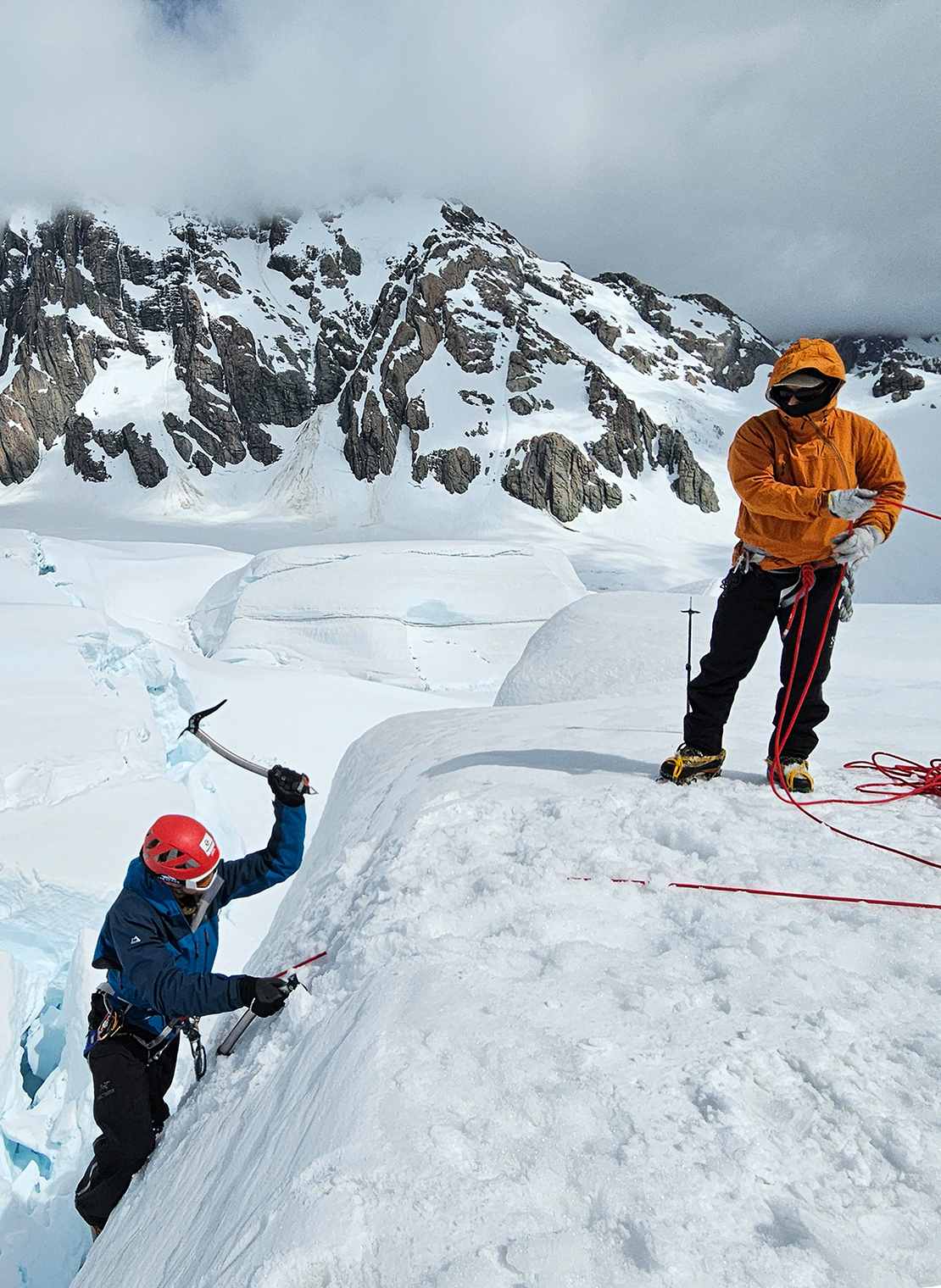
The Adventure Consultants story evolved from the Southern Alps of New Zealand where large glaciated mountains forged our passion for high places. It is a legacy that still exists today through guided ascents and instruction programs. We work with the best guides in the country to bring you high-quality programs that introduce you to the best the country has to offer and we regularly partner with Alpine Guides (Aoraki) to provide professional guiding under the IFMGA qualification program.

The price of your trip includes the following:
- Professional IFMGA/NZMGA mountain guides
- Cost of helicopter access and egress from the mountains
- All meals including snacks and energy bars
- Hut fees, and local accommodation as required (inside trip dates)
- Technical equipment
- Technical manual.
Just how fit is 'fit enough'? Mountaineering is a demanding activity. The fitter you are the more you will enjoy your time with us. Unless you regularly climb, bushwalk/hike, and are used to long days carrying a pack, you will need to train for mountaineering.
Mountaineering is primarily an aerobic activity
Strength is important for lifting a pack, but it is more important to build up your aerobic fitness level and stamina for long climbing days. Aerobic fitness can only be improved over months - so start your training program now.
As you come close to the time for your climbing trip try to use a few weekends to load up with a 7-10 kg pack and walk all day (8 hours), up hills, if possible, to work on endurance.
Don’t underestimate how rigorous mountaineering can be. It is better to be over-prepared.
See our Fitness Training page for training tips and programs.
The summer climbing period extends from November to early-April. You must be prepared for a wide range of conditions, from very warm, to cold snowy days. As the summer season advances access on to climbing routes will change.
Summer Temperatures and Daylight Hours
- Actual air temperatures may be 8°C, but can feel like 28°C due to reflected radiation.
- Coolest period: November to mid-December, and March-April. Range -10°C to +10°C
- Warmest period: January and February. Range -5°C to +15°C
- Daylight hours: 05:00 to 21:00, with shorter days later in the season.
Changing Snow Conditions
During November and December access on to routes is usually easier, due to fewer crevasses. Expect fresh snow during storms. Your guide will place greater emphasis on avalanche awareness. Avalanche transceivers are normally carried.
The snowpack is deeper and "wetter". Conditions can be soft underfoot early in the season, especially in the afternoon.
From January onwards the snowpack will consolidate (shallower foot penetration). Crevasses are larger. Crevasse bridging is weakest. Less chance of snowfall. Rock fall hazard increases.
Late Season - March onwards: Conditions are typically "hard" underfoot. Crevassing is at its greatest extent. Night temperatures are dropping. Greater chance of snowfall.
For international visitors, Christchurch or Queenstown are the main entry points to the South Island, with the most public transport options. Christchurch has more direct flights.
Intercity Coaches
Intercity Coaches provide direct daily services routes to Aoraki Mount Cook to and from Queenstown and Christchurch. Visit the Intercity website here. We recommend buying a FlexiPass to make considerable savings on your bus fare.
Cheeky Kiwi Travel
Get a shuttle directly to Mount Cook with Cheeky Kiwi Travel. They operate out of Christchurch and Queenstown.
If you have a mountaineering trip booked with us and are unable to coordinate transport from Twizel, please check in with us. We can help arrange transport from Twizel to Mt Cook.
In the remote mountains of New Zealand, there are no cable cars or roads to high elevations to provide easy access to the mountains. Walking into many mountain venues can use up to 2 days of your trip, across very rugged terrain.
To make the best use of your time many of our trips use aircraft access. When you arrive the scale, and nature of the terrain, will make the logic for flying obvious.
Flying access and egress is included in the cost of the Alpine Skills Course.
Walking out from your mountain venue is possible, but flying out is by far the more popular choice. Walking out may be beyond your fitness, especially at the end of a long trip. Conditions and weather may dictate that a flight out is the safer choice. Your guide will discuss these options with you.
Once you have made your booking we strongly advise buying travel insurance, to cover you for unexpected cancellations, or other misadventures on your travels. Travel insurance cancellation policies will protect you from losing the deposit for your trip if you have to cancel unexpectedly.
Insurance specifically for mountaineering activities is optional. New Zealand's Accident Compensation Corporation (ACC) system extends to all visitors to New Zealand and includes cover in the event of an accident.
Any travel agent, or insurance broker (even your credit card provider) can assist with standard insurance, including insurance for trip cancellation.
The New Zealand Alpine Club can provide insurance coverage for their New Zealand and Australian members visiting NZ.
